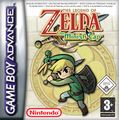| Don't like the ads? Then create an account! Users with accounts have more options than anonymous users. |
The Legend of Zelda: The Minish Cap
It has been requested that this article be rewritten and expanded to add descriptions for characters, enemies, items.
| The Legend of Zelda: The Minish Cap | |||||||
|---|---|---|---|---|---|---|---|
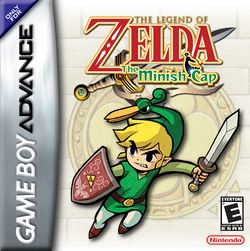
| |||||||
| Developer(s) | Capcom, Flagship | ||||||
| Publisher(s) | Nintendo | ||||||
| Release date | Game Boy Advance: Virtual Console (3DS) (Ambassador Program Release): Virtual Console (Wii U): | ||||||
| Genre(s) | Action-adventure | ||||||
| Rating(s) |
| ||||||
| Console(s) | Game Boy Advance, Virtual Console (3DS, Wii U) | ||||||
| Mode(s) | Single player | ||||||
The Legend of Zelda: The Minish Cap is the twelfth game of The Legend of Zelda series. It was released for the Game Boy Advance in 2004 in Japan and Europe and in North America and Australia the following year, 2005. The game stars Link and a talking hat named Ezlo, who must save Hyrule and Princess Zelda from the evil wind sorcerer Vaati while taking advantage of portals along the way to shrink to the size of the Minish people. The game is a prequel to The Legend of Zelda: Four Swords, as it revolves around the backstory of Vaati and the creation of the Four Sword.
In December 2011, The Legend of Zelda: The Minish Cap was re-released for the Nintendo 3DS's Virtual Console, exclusively for Ambassador Program users, as one of the ten free Game Boy Advance games. In 2014, the game was released as a downloadable Wii U Virtual Console title, priced at $7.99.
Story[edit]

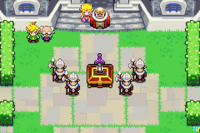
When starting a new save file, the game's backstory is shown. Years ago, the world was being conquered by evil. The Minish (also called "Picori" by Hyrule) appeared from the sky, granting a sword and a golden light to a young boy dressed in green (who is an earlier incarnation of Link). With wisdom and courage, the boy conquered the darkness and restored peace to the world, earning himself the title, "hero of men". When peace was restored, the people enshrined the blade in a chest and hid it away.
In the present, Princess Zelda visits Link, offering him to visit the Picori Festival with her. It is an annual festival made to commemorate the Minish, and legend states that the Minish come to Hyrule once every one hundred years through a mystical doorway. The current Picori Festival, which Link and Zelda go to, is more notable because it has been one hundred years since the Minish visited. Before Link leaves, Master Smith gives the Smith's Sword to Link, instructing him to the deliver it to Hyrule Castle. The Smith's Sword is the Picori Blade, which would be presented to the winner of the Picori Festival's sword-fighting competition.
Later during the ceremony, the competition's winner, Vaati, shows up for the Picori Blade. Because of Vaati's malicious intent, the castle guards try to stop him from touching the blade. Vaati releases a blue, electrical ball at the Picori Blade, making the sword's handle break off. The Bound Chest then opens, and many monsters are released into Hyrule. Realizing that Zelda has a mysterious power of light, Vaati deems her to be a threat, so he uses a dark spell to turn her into stone. Link tries to defend Zelda, but Vaati's spell knocks him aside. Link lies on the ground unconscious. Vaati is searching for the Light Force, so he looks into the Bound Chest but finds nothing in it. Vaati leaves, continuing his search for the Light Force.

Link wakes up in Hyrule Castle. He goes into the foyer, where King Daltus talks about how the Minish could repair the Picori Blade and break the curse upon Zelda. He instructs Link to go into the Minish Woods and search for the Minish, because they only reveal themselves to children. While exploring Minish Woods, Link encounters two Octoroks attacking a living green hat with a bird-like head. The hat's name is Ezlo, and he introduces himself to Link after being freed. Ezlo decides to join Link but he stays on Link's head because Ezlo cannot move as fast. They soon come across a portal, which shrinks them to Minish size, and using it again returns Link and Ezlo to normal size. Link and Ezlo enter the Minish Village and meet the elder Gentari, who tells them that the Picori Blade can only be reforged using the Four Elements.
Shortly after retrieving the Fire Element, Ezlo reveals to Link that he and Vaati are Minish and gives a backstory of when he was a renowned sage and craftsman and Vaati was his apprentice. Ezlo made a hat for the humans, the Mage's Cap, which grants any wish by the wearer. Vaati had put on the hat without Ezlo's permission, and with a lust for power, Vaati wished to become a powerful sorcerer. Vaati then transformed Ezlo into a green hat. Meanwhile, Vaati impersonates King Daltus and orders the castle soldiers to search for the Light Force.
After retrieving the Four Elements, Link takes them to the Elemental Sanctuary, which also serves as a gateway between Hyrule and the Minish world. Link infuses the energy from the Four Elements to turn the White Sword, which was forged from the broken Picori Blade, into the Four Sword. Link can then access a room with a stained glass windows. The same intro as in the opening is shown but with an additional scene which confirms that the Light Force is within the princess of Hyrule, Princess Zelda. Vaati enters the room (still disguised as King Daltus) and figures out where the Light Force is located. Vaati reveals himself, knocks out Link, and leaves, planning to extract the Light Force from Zelda.
Shortly after, Ezlo wakes up Link, and the two re-enter Hyrule Castle, which has become Dark Hyrule Castle. Link reaches the top of Hyrule Castle and fights Vaati just before he can drain all of Zelda's Light Force, which would have killed her in the process. Link engages in a boss battle against Vaati, who changes his form at parts of the battle.
Link manages to defeat Vaati, causing the Mage's Cap to be released. Link ends up in a room of Hyrule Castle with Zelda, standing in front of the Minish Door. Ezlo returns to his normal form, because the curse on him broke when Link defeated Vaati. Zelda puts on the Mage's Cap and wishes for Vaati's damage unto Hyrule to be undone. After Zelda makes the wish, Ezlo says goodbye to Link and Zelda, and he gifts Link with an actual green cap. Ezlo leaves through the Minish Door, which then vanishes, and the game ends.
Gameplay[edit]

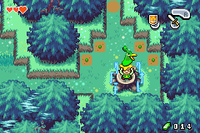
The Legend of Zelda: The Minish Cap is a two-dimensional game that retains the core gameplay from earlier The Legend of Zelda installments. It is mostly comparable to its prequel, The Legend of Zelda: Four Swords, which is also for the Game Boy Advance. Like the other games, The Legend of Zelda: The Minish Cap is viewed from a top-down perspective, and has a closer view to the ground than earlier games, allowing for more visual detail. The game takes place within Hyrule, and has an overworld with a variety of environments, most of it being a field; other environments include a forest, a canyon, a swamp, a lake, the clouds, and a graveyard. There are a few dungeons, each with a unique item that is required to defeat the boss and for progressing into the overworld.
Some of the gameplay features are from the three-dimensional The Legend of Zelda games, namely The Legend of Zelda: Ocarina of Time. Several of the Hylian characters debuted in said game. Up to two items can be equipped and assigned to either the A or B button respectively. The item interface is at the top-right corner, and it shows an icon of the item over the button. This makes it similar to the three-dimensional The Legend of Zelda games, although earlier handheld games also have items assigned to the A and B buttons. Pressing the R button makes Link perform a roll, a move which originated from The Legend of Zelda: Ocarina of Time. The combat system is enhanced from previous handheld installments, as Link can learn new sword techniques from the Blade Brothers.
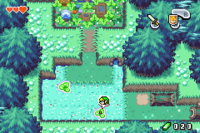
The game has a unique mechanic where Link and Ezlo can enter a portal to shrink to the size of the Minish race. By using the portal again, Link and Ezlo return to their normal size. When Link is Minish size, he has little visibility from the overworld, so his current location is represented by his head within a speech bubble-like icon. It reflects the direction that Link is facing or moving in. At this size, large patches of grass become walls for Link, puddles become large bodies of water, and he can fall into cracks in the ground. The Four Elements and the White Sword are another unique mechanic. The Four Elements can each be infused with the White Sword. As Link infuses more with his sword, he can make more temporary copies of himself from glowing floor panels. These duplicates are required for some puzzles in later parts of the game, such as to push large blocks or to step on a few switches simultaneously.
If Link goes into an area that he can only access at Minish size, such as the Minish Village, the game provides the same zoomed-in view as if Link were normal size. The first dungeon, Deepwood Shrine, is only accessible if Link is Minish size. When Link is at normal size, Deepwood Shrine is a small structure, but at Minish size, it becomes an entire dungeon for Link. From a Minish perspective, common enemies that Link encounters at normal size, such Octoroks, become giant. The first boss, Big Green Chuchu, is a normal Chuchu that Link fights while Minish-sized.
Characters[edit]
Main and supporting characters[edit]
| Sprite | Name | Description |
|---|---|---|
| Link | The main hero and playable character, Link goes on an adventure to stop Vaati from retrieving the Light Force. | |
| Ezlo | Ezlo is Link's partner throughout the game. Formerly a Minish sorcerer, Ezlo was changed into a green bird-like hat by Vaati. Ezlo is first found in the Minish Woods, being attacked by two Octoroks. Ever since Ezlo is rescued, he accompanies Link in his adventure. Ezlo sits on Link's head, giving off the appearance of Link wearing his trademark green hat. | |
| Festari | Festari is a Forest Minish who can speak and understand Hylian language. He guards the path to Deepwood Shrine early in the game. | |
| Gentari | Gentari is an elder of the Minish Village. He marks the locations for all four elements on Link's map. | |
| King Daltus | He is the king of Hyrule and Zelda's father. King Daltus is first seen at the Picori Festival's ceremony. Vaati later disguises himself as King Daltus, searching for the Light Force. | |
| Melari | He is a Minish blacksmith who is found at the peak of Mt. Crenel. He reforges the broken Picori Blade into the White Sword for Link. | |
| Minish (Forest, Library, Mountain, Town) |
A very small species which is visible only to children. The Minish are also known as the Picori from Hylians, and they are the main and titular species for the game. | |
| Minister Potho | He is a minister of Hyrule, working for the Royal Family, and the tutor of Princess Zelda. | |
| Princess Zelda | Zelda is the princess of Hyrule and a childhood friend of Link's. In the game, Vaati turns Zelda into stone in fear of her magical powers. Link can only free Zelda once he has the Four Sword. | |
| Smith | The grandfather of Link and a renowned swordsman in Hyrule. | |
| Vaati | Vaati is the main antagonist, and Link goes on an adventure to stop Vaati from obtaining the Light Force. Vaati is fought at Dark Hyrule Castle under three separate forms. |
Other characters[edit]
Enemies[edit]
Obstacles[edit]
| Sprite | Name | Description |
|---|---|---|
| Boulder | ||
| Cannon | ||
| Chaser | ||
| Door Mimic | ||
| Fire bar | ||
| Flying Pot | ||
| Flying Skull | ||
| Rolling Pin | ||
| Trap |
Mini-bosses[edit]
| Sprite | Name | Description |
|---|---|---|
| Madderpillar | A caterpillar that is encountered twice, in Deepwood Shrine and the Temple of Droplets. To attack Madderpillar, Link must slash its nose to make its end segment vulnerable to further attack. | |
| Dark Nut | ||
| Big Blue Chuchu | A blue, electrical counterpart to Big Green Chuchu. It is fought similarly but surrounds itself with an electrical aura protecting him from attacks. | |
| Red Dark Nut | ||
| Black Knight |
Bosses[edit]
| Sprite | Name | Description |
|---|---|---|
| Big Green Chuchu | A normal Chuchu that is the boss of Deepwood Shrine. To defeat Big Green Chuchu, Link must use the Gust Jar to suck at the base, causing it to fall over. Link must then repeatedly slash at Big Green Chuchu with his sword. After enough hits, the boss is defeated. | |
| Gleerok | Gleerok is a fiery reptile and the second boss, who is fought in the Cave of Flames. To attack Gleerok, Link must stun it with the Cane of Pacci, walk across its neck, and slash at its body with his sword. | |
| Mazaal | Mazaal is a large statue fought in the Fortress of Winds and the third boss. To attack Mazaal, Link must shoot Arrows at its hands, stunning it, and then strike it with his sword. Afterward, Link must enter a portal to become Minish size, then enter Mazaal's mouth and strike the pillar depicting a face. | |
| Big Octorok | Big Octorok is a regular Octorok fought by Link while Minish-sized. It is the fourth boss, fought in the Temple of Droplets. To attack, Link must use his shield to deflect the rocks spit by Big Octorok back at it. Later in the battle, Big Octorok becomes icy, and Link can attack it by using the Flame Lantern to put Big Octorok's tail on fire. | |
| Gyorg Pair | A pair of large manta rays acting as the fifth boss in the game. To defeat the large, red Gyorg, Link must use the magic tiles to create three clones of himself and then hit the large, red Gyorg's eyes when they open. The small, light blue Gyorg can be defeated by striking its single eye. | |
| Vaati Reborn | Vaati Reborn is the first form of Vaati. To attack him, Link must hit the surrounding eyes to expose Vaati Reborn's red eye, which Link must repeatedly slash at with his sword. Later in the battle, Vaati Reborn sends out black spheres to protect the eyes from damage, and Link must suck them up with the Gust Jar. | |
| Vaati Transfigured | Vaati Transfigured is the second form of Vaati. Link must slash at Vaati Transfigured's eyes until it exposes four red eyes. To attack the boss, Link must use the glowing tiles to create three clones of himself and then strike Vaati Transfigured's red eyes. | |
| Vaati's Wrath | The third and final form of Vaati. When Link defeats this form, Vaati's Wrath is defeated altogether. To defeat him, Link must use the Cane of Pacci to flip over Vaati's Wrath's arms. Link must then shrink himself from a portal to enter the arms and strike the red eye until the arm is destroyed. After destroying both of Vaati's Wrath's arms, Link must create three clones of himself and then hit energy balls at Vaati's Wrath when his eyes turn blue. By doing so, Vaati's Wrath becomes vulnerable to Link's sword attack. |
Items[edit]
| Sprite | Name | Description |
|---|---|---|
| Boomerang | ||
| Bomb | ||
| Bow and Arrows | ||
| Broken Picori Blade | ||
| Cane of Pacci | The Cane of Pacci sends out a yellow beam capable of flipping certain objects, such as vase portals. The beam can also be fired into a small hole, which Link can launch himself from. | |
| Carlov Medal | ||
| Flame Lantern | The item is used to illuminate dark areas, melt ice and burn bushes and grass. | |
| Flippers | Allows Link to swim in water. | |
| Four Elements (Earth, Fire, Water, Wind) |
||
| Four Sword | When all Four Elements are infused into the White Sword, it becomes the Four Sword. If there are three glowing floor tiles, Link can create up to three clones of himself from them. | |
| Graveyard Key | ||
| Grip Ring | This ring allows Link to climb cliff faces and certain walls. | |
| Gust Jar | The Gust Jar sucks in nearby items and certain enemies, which can be fired as projectiles. The Gust Jar's suction is required to be used on some objects, such as to steer a lilypad, or on a mushroom so that Link can be flung across a body of water or a pit. | |
| Jabber Nut | When Link eats the Jabber Nut, he understands the Minish language for the rest of his adventure. | |
| Light Arrow | These arrows are charged with the power of light and deal more damage to enemies than regular arrows. | |
| Lon Lon Ranch key | The key to Talon and Malon's house. Link must retrieve it so they can unlock their house. | |
| Magic Boomerang | When throwing this boomerang, Link can guide it to move in a specific direction instead of a straight line. | |
| Map of Hyrule | An map showing an overview of the Hyrule overworld and its locations. | |
| Mirror Shield | The shield has a reflective surface, allowing Link to deflect certain attacks back at an enemy. | |
| Mole Mitts | Clawed gloves allowing Link to dig through dirt barriers and dig a hole in the ground. It also allows him to pick up rocks and bushes. | |
| Ocarina of Wind | An ocarina that takes Link to any Wind Crest he has activated. | |
| Pegasus Boots | These allow Link to charge forward at high speed. He can also learn to hold his sword in front while charging forward. | |
| Power Bracelets | These bracelets make Link stronger, enabling him to lift heavy objects, even at Minish size. | |
| Remote Bomb | These Bombs only explode at Link's command. Link can obtain Remote Bombs by talking to Belari and swapping his regular Bombs for them and vice versa. | |
| Roc's Cape | A cape allowing Link to jump in midair to dodge hazards, pits, and enemy attacks. Link can learn a Sword Technique to thrust down to enemies with his sword while jumping. | |
| Small Shield | As directly stated by the name, it is a small shield that protects Link from basic enemy projectiles, such as those from Octoroks. Zelda wins the item for Link at the start of the game. | |
| Smith's Sword | The first sword that Link obtains, the Smith's Sword is a basic sword that was made by his grandfather, Smith. | |
| Swordsman Newsletter | ||
| Tiger Scroll | ||
| Tingle Trophy | ||
| Wake-Up Mushroom | ||
| White Sword |
Pick-up[edit]
These are the main pick-up items.
| Sprite | Name | Description |
|---|---|---|
| Big Key | ||
| Compass | ||
| Dungeon Map | ||
| Heart | ||
| Heart Container | ||
| Joy Butterfly | ||
| Kinstone piece | The Kinstone pieces obtained by Link are always the left half of a Kinstone. Many Kinstone pieces vary by shape and color (either red, blue, or green). If a thought bubble is over a character, they have a Kinstone piece, always being the right half of one. If Link has a corresponding Kinstone piece, he and a character can connect the two pieces to form a whole Kinstone. This causes something good to happen in the overworld, such as a treasure chest appearing or a hidden area becoming accessible. Most Kinstone fusions are optional, although fusing Golden Kinstones is required. | |
| Mysterious Shell | ||
| Piece of Heart | ||
| Rupee | ||
| Small Key |
Bottled items[edit]
It has been requested that one or more images be uploaded and added to this article. Remove this template once the image(s) has/have been uploaded and applied. Specifics: picolyte sprites
| Sprite | Name | Description |
|---|---|---|
| Blue Potion | ||
| Din's Charm | ||
| Dog Food | ||
| Fairy | ||
| Farore's Charm | ||
| Lon Lon Milk | ||
| Mt. Crenel Mineral Water | ||
| Nayru's Charm | ||
| Picolyte | ||
| Red Potion | ||
| Water |
Bags and containers[edit]
| Sprite | Name | Description |
|---|---|---|
| Bomb Bag | ||
| Empty Bottle | ||
| Kinstone Bag | A bag where Link stores his collected Kinstone pieces. | |
| Quiver | ||
| Wallet |
Locations[edit]
- Castor Wilds
- Cloud Tops
- Eastern Hills
- Elemental Sanctuary
- Fairy Fountain
- Fountain
- Great Fairy Fountain
- Hyrule Castle
- Hyrule Castle Garden
- Hyrule Town - Located at the center of the overworld, Hyrule Town does not have any enemies. Link can do several optional side quests in Hyrule Town, such as play games for prizes, help other characters, and buy items and equipment from stores.
- Lake Hylia
- Lon Lon Ranch
- Melari's Mine
- Minish Village
- Minish Woods
- Mount Crenel
- Mount Crenel's Base
- Royal Crypt
- Royal Valley
- Trilby Highlands
- Veil Falls
- Western Wood
- Wind Ruins
Buildings[edit]
- Dampé's Shack
- Figurine Gallery
- Funday School
- Happy Hearth Inn
- Link's House
- Mama's Cafe
- Mayor Hagen's Lakeside Cabin
- Percy's House
- Post Office
- Rem's Shoe Store
- Royal Hyrule Library
- Stockwell's Shop
- Syrup's Hut
Dungeons[edit]
- Deepwood Shrine
- Cave of Flames
- Fortress of Winds
- Temple of Droplets
- Palace of Winds
- Dark Hyrule Castle
Development and release[edit]
After Capcom and its subsidiary Flagship finished developing the Oracle games, they began work on a new Zelda game for the Game Boy Advance. Work on the title was suspended to allow the teams to focus on The Legend of Zelda: Four Swords, but in February 2003 Shigeru Miyamoto and Eiji Aonuma announced that a The Legend of Zelda game, which would become The Legend of Zelda: The Minish Cap, was under development for the Game Boy Advance.[1]
In an interview with Nintendo of Europe, producer Eiji Aonuma said that The Legend of Zelda: The Minish Cap was given an art style similar to The Legend of Zelda: The Wind Waker, as they they share a common fairy tale-like theme.[2]
The Legend of Zelda: The Minish Cap is the first game of The Legend of Zelda series to be released in Europe before North America. In Europe, the game was released for the holiday season, in November 2004. In North America, the game was released in January 2005, rumored to be because of the Nintendo DS's launch,[3][4] but sources at Nintendo vaguely mentioned "more" was being added in the North American version.[5]
On November 12, 2004, the Zelda Limited Edition Pak bundle was released exclusively in Europe. It consists of a gold Game Boy Advance SP and a copy of The Legend of Zelda: The Minish Cap. Only 25,000 of these units were made.[citation needed]
Reception[edit]
The Legend of Zelda: The Minish Cap has been met with critical acclaim, with an average review score of 9/10. The most common criticism of the game is its short length, as stated in both the GameSpot and Eurogamer reviews.
| Reviews | |||
|---|---|---|---|
| Release | Reviewer, Publication | Score | Comment |
| Game Boy Advance | Craig Harris, IGN |
9/10 | "The Minish Cap is certainly worthy to sit among the best of the Zelda best. The slight repetitive nature of the kinstones, the slightly shorter quest, and the lack of the four player Four Swords mode does put this new adventure slightly under the previous GBA effort. It's still a fantastic offering on the handheld, retaining everything that makes a Zelda title so great, improving the single-player quest with ideas the team introduced in the first multiplayer Legend of Zelda title. And it definitely bodes well for the future of the property when the development team moves these ideas into another 2D adventure for our Nintendo hero." |
| Game Boy Advance | Brad Shoemaker, GameSpot |
9.1/10 | "With Zelda games on the big consoles having long ago transitioned to 3D, and with Nintendo's new focus on its 3D-capable DS in the handheld market, it's not too far-fetched to imagine that The Minish Cap will be the last totally original 2D Zelda game. The game easily lives up to its predecessors, with enough questing and variety to keep you entertained for the duration of its storyline and beyond. Whether or not this game represents the end of an era for this hallowed franchise, it's a superb game in its own right that any fan of Zelda, and indeed any Game Boy Advance-owning fan of adventure games, shouldn't be without." |
| Game Boy Advance | Bro Buzz, GamePro | 4/5 | "The Legend of Zelda: The Minish Cap is a great addition to the series. Going backwards instead of forwards in the timeline was a masterstroke it's totally satisfying for fans and does nothing but stoke the fires for the forward-looking, new GameCube tale coming in 2005. If this is how The Legend of Zelda handles the origin of just one article of the hero's clothing, one can hardly wait to experience the revelations to come about the rest of his outfit. You've got to tip your cap to Nintendo." |
| Game Boy Advance | Tom Bramwell, Eurogamer | 9/10 | "Hopefully we can get away with sidestepping the whole debate about how long a game really ought to be. It is somewhat subjective, and The Minish Cap is a gem for as long as it does sparkle unsolved in your cartridge slot, but given the length of previous Zeldas this one could come as something of a shock. We know people who have completed it in one day, and they weren't passing up the chance to smash the odd wall or solve the riddle of an unreachable treasure chest, either.
But then every wave has to splash down sometime, and while you're riding this one it's as pleasurable an experience as you could hope for. The formula remains the same but the experience is just as essential as ever - and every attempt to nudge it in a slightly new direction comes off without a hitch. If you can accept that it won't last you as long as you might like, then your quest is clear: leave no stone unturned in your search for this game, and then leave none of its stones unturned either." |
| Aggregators | |||
| Compiler | Platform / Score | ||
| Metacritic | 89 | ||
Awards and recognition[edit]
In 2005, GameSpot ranked The Legend of Zelda: The Minish Cap as the "GBA Game of the Year".[6] GameSpy gave the game two awards, "2005 GBA Game of the Year" and "2005 GBA Adventure of the Year".[7]
In March 2007, the game was ranked 20th on IGN's "Top 25 Game Boy Advance games".[8] In Februrary 2009, the game was ranked 47th in Official Nintendo Magazine's "100 Greatest Nintendo Games" feature.[9]
Nintendo Power awarded the game as "2005 GBA Game of the Year", from readers and writers alike. The game also ranked 24th on Nintendo Power's "NP Top 200" list.
Sales[edit]
The Legend of Zelda: The Minish Cap was the best-selling game in its debut week in Japan, selling 97,000 copies[10], and it sold about 350,000 copies in Japan overall.[11] In North America, The Legend of Zelda: The Minish Cap sold 217,000 copies in its debut month of January 2005, being the fourth best-selling game of the month.[12] During the following February, The Legend of Zelda: The Minish Cap was the fifth best-selling game.[13][14] By the end of 2005, the game sold 1 million units worldwide.[15]
Gallery[edit]
- For this game's image gallery, see Gallery:The Legend of Zelda: The Minish Cap.
-
Logo
-
European box art
-
North American title screen
Names in other languages[edit]
| Language | Name | Meaning |
|---|---|---|
| Japanese | ゼルダの伝説 ふしぎのぼうし Zeruda no Densetsu: Fushigi no Bōshi |
The Legend of Zelda: The Mysterious Hat |
Trivia[edit]
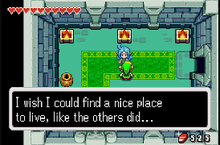
- The game has a developmental in-joke to the Oracle games for Game Boy Color. In an optional side-quest, Link must aid the three Oracles, Din, Nayru, and Farore, to find a house to stay in. Link can only provide housing for two of them, and although their landlord, Gorman, makes reference to building a third house, this never occurs in the game. There was a third Oracle game, The Legend of Zelda: Mystical Seed of Courage, which revolved around Farore, the Oracle of Secrets, but it was cancelled.
External links[edit]
- Official North American website (archived)
- Official European website (mirrored)
- Official Japanese website
References[edit]
- ^ "Miyamoto Confirms New Zelda". IGN. Published February 24, 2003.
- ^ Interview with Eiji Aonuma by Nintendo of Europe. landofthelegend.net (archived).
- ^ Minish Cap Site Launches on IGN. Published September 14, 2004.
- ^ ""Zelda: Minish Cap to hit Europe before US". GameSpot (archived). Posted September 3, 2004.
- ^ "Wait" for US Minish Cap on IGN. Published October 19, 2004.
- ^ "GameSpot's Best of 2005 - Platform Awards". GameSpot (Wayback Machine).
- ^ GameSpy's Game of the Year 2005. (Wayback Machine)
- ^ Top 25 Game Boy Advance Games of All Time. IGN. Published March 16, 2007.
- ^ 100 Best Nintendo Games: Part 3 - Official Nintendo Magazine (Wayback Machine)
- ^ "Japanese Sales Charts, Week Ending November 7th". Gamasutra. Published November 12, 2004
- ^ "Big Zelda Sales In Japan". Wired. Published June 26, 2007.
- ^ "NPD: January console-game revenues flat". GameSpot. Published February 17, 2005.
- ^ "ChartSpot: February 2005". GameSpot. Published March 29, 2005.
- ^ "Top of the Console Pops". IGN. Published March 17, 2005.
- ^ "Nintendo 2005 Annual Report" (PDF), page 37.

